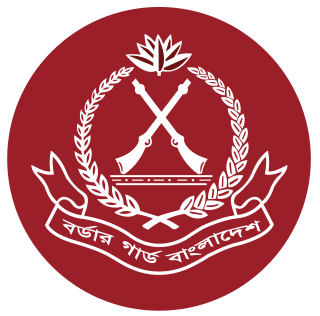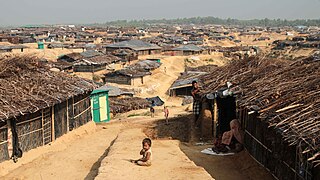Related Research Articles

The Rohingya people or historically called Arakanese Indians are a stateless ethnic group who predominantly follow Islam and reside in Rakhine State, Myanmar. Before the Rohingya genocide in 2017, when over 740,000 fled to Bangladesh, an estimated 1.4 million Rohingya lived in Myanmar. Described by journalists and news outlets as one of the most persecuted minorities in the world, the Rohingya are denied citizenship under the 1982 Myanmar nationality law. There are also restrictions on their freedom of movement, access to state education and civil service jobs. The legal conditions faced by the Rohingya in Myanmar have been compared to apartheid by some academics, analysts and political figures, including Nobel laureate Bishop Desmond Tutu, a South African anti-apartheid activist. The most recent mass displacement of Rohingya in 2017 led the International Criminal Court to investigate crimes against humanity, and the International Court of Justice to investigate genocide.

Border Guard Bangladesh, better known as BGB, is a paramilitary force responsible for the border security of Bangladesh. The BGB is entrusted with the responsibility to defend the 4,427 kilometres (2,751 mi) border of Bangladesh with India and Myanmar. It was formerly known as the Bangladesh Rifles.

Medair is an international non-governmental organisation (INGO) whose purpose is to relieve human suffering in some of the world's most remote and devastated places. Medair aims to assist people affected by natural disasters and conflict to recover with dignity through the delivery of quality humanitarian aid.
In different administrative and organizational forms, the Food for Peace program of the United States has provided food assistance around the world for more than 60 years. Approximately 3 billion people in 150 countries have benefited directly from U.S. food assistance. The Bureau for Humanitarian Assistance within the United States Agency for International Development (USAID) is the U.S. Government's largest provider of overseas food assistance. The food assistance programming is funded primarily through the Food for Peace Act. The Bureau for Humanitarian Assistance also receives International Disaster Assistance Funds through the Foreign Assistance Act (FAA) that can be used in emergency settings.

Acted is a French international solidarity non-governmental organization (NGO), founded in 1993. It is headquartered in Paris.

World Concern is a Christian global relief and development organization operating in Africa, Southeast Asia, and Haiti, with its headquarters located in Seattle, Washington, United States. World Concern serves approximately 6 million people worldwide and has a staff of 877, with 846 of those being international and 31 based at headquarters.
Food for the Hungry is a Christian international relief, development, and advocacy organization. Food for the Hungry was founded in 1971 by Larry Ward. Food for the Hungry's stated mission for long-term development is to graduate communities of extreme poverty within 10–15 years. The organization also works in disaster relief and humanitarian response, including working with the Rohingya refugees in Bangladesh and Syrian refugees in Lebanon.

At least 29 tropical cyclones have affected Myanmar, a country adjacent to the Bay of Bengal in mainland Southeast Asia. Myanmar has witnessed some of the deadliest storms in the Bay of Bengal, including Cyclone Nargis in May 2008, which struck the low-lying Irrawaddy Delta near Yangon. Its winds and storm surge killed an estimated 140,000 people and left nearly $10 billion in damage. The country's worst natural disaster in the 20th century was a cyclone in 1968, which killed more than 1,000 people when it hit Rakhine State in northwestern Myanmar. One of the most powerful storms to ever hit the country was Cyclone Mocha, which it moved ashore northwestern Myanmar in May 2023, killing at least 413 people.

Climate change is a critical issue in Bangladesh. as the country is one of the most vulnerable to the effects of climate change. In the 2020 edition of Germanwatch's Climate Risk Index, it ranked seventh in the list of countries most affected by climate calamities during the period 1999–2018. Bangladesh's vulnerability to the effects of climate change is due to a combination of geographical factors, such as its flat, low-lying, and delta-exposed topography. and socio-economic factors, including its high population density, levels of poverty, and dependence on agriculture. The impacts and potential threats include sea level rise, temperature rise, food crisis, droughts, floods, and cyclones.

In 2015, hundreds of thousands of Rohingya people were forcibly displaced from their villages and IDP camps in Rakhine State, Myanmar, due to sectarian violence. Nearly one million fled to neighbouring Bangladesh and some travelled to Southeast Asian countries including Malaysia, Indonesia, Cambodia, Laos and Thailand by rickety boats via the waters of the Strait of Malacca, Bay of Bengal and the Andaman Sea.
Islamic Help is a UK based charity that was founded in 2003 and works both internationally and within the UK. According to their registration with the UK Charity Commission, “Islamic Help provides humanitarian assistance all around the world. Support is also provided to the needy, widows, victims of emergency natural/manmade disasters and homelessness in the UK”. Islamic help characterizes itself by its ability to inspire, motivate, and mobilize young individuals wishing to provide assistance to disaster stricken communities.

The Armed Forces Division (AFD) is the principal national command authority for national defense of the People's Republic of Bangladesh. The command and control of the Bangladesh Armed Forces is exercised in this division, under direct control and supervision by the prime minister, who is also in charge of Ministry of Defence. The headquarters is located in Dhaka Cantonment.

The Ministry of Disaster Management and Relief is a ministry of the government of the People's Republic of Bangladesh, responsible for disaster management and relief. After the independence of Bangladesh in 1972, two separate ministries namely Ministry of Relief and Rehabilitation and Ministry of Food were formed. In 1982, the two ministries were merged into two departments under the Ministry of Food; namely - the Food Department and the Relief and Rehabilitation Department. Later, in 1988, the Department of Relief and Rehabilitation was renamed as Ministry of Relief. But this was reversed, when in 2004, the Ministry of Disaster Management and Relief and the Ministry of Food were merged to form the Ministry of Food and Disaster Management. Finally, in 2012, the Department of Disaster Management and Relief was again transformed into the Ministry of Disaster Management and Relief.

The Rohingya genocide is a series of ongoing persecutions and killings of the Muslim Rohingya people by the military of Myanmar. The genocide has consisted of two phases to date: the first was a military crackdown that occurred from October 2016 to January 2017, and the second has been occurring since August 2017. The crisis forced over a million Rohingya to flee to other countries. Most fled to Bangladesh, resulting in the creation of the world's largest refugee camp, while others escaped to India, Thailand, Malaysia, and other parts of South and Southeast Asia, where they continue to face persecution. Several countries consider these events ethnic cleansing.

Rohingya refugees in Bangladesh mostly refer to forcibly displaced Myanmar nationals from Myanmar who are living in Bangladesh. The Rohingya people have experienced ethnic and religious persecution in Myanmar for decades. Hundreds of thousands have fled to other countries in Southeast Asia, including Malaysia, Indonesia, and Philippines. The majority have escaped to Bangladesh, where there are two official, registered refugee camps. Recently violence in Myanmar has escalated, so the number of refugees in Bangladesh has increased rapidly. According to the UN Refugee Agency (UNHCR), more than 723,000 Rohingya have fled to Bangladesh since 25 August 2017.

Kutupalong refugee camp is the world's largest refugee camp. It is located in Ukhia, Cox's Bazar, Bangladesh, and is inhabited mostly by Rohingya refugees who fled from ethnic and religious persecution in neighboring Myanmar. It is one of two government-run refugee camps in Cox's Bazar, the other being the Nayapara refugee camp.

The Rohingya genocide is a term applied to the persecution—including mass killings, mass rapes, village-burnings, deprivations, ethnic cleansing, and internments—of the Rohingya people of western Myanmar.
Leda makeshift settlement is a refugee camp constructed for Rohingya refugees on government-owned land in Nhilla Union of the Teknaf sub-district in Cox's Bazar, Bangladesh. The camp is located some 15 km (9.3 mi) from Teknaf town.

The Office of the Refugee Relief and Repatriation Commissioner is a Bangladesh government agency under the Ministry of Disaster Management and Relief responsible for providing relief to Rohingya refugees in Bangladesh and plan their eventual repatriation to Myanmar. Shah Rezwan Hayat is the incumbent commissioner.
The Ministry of External Affairs of India launched the Operation Insaniyat to help Bangladesh in overcoming the humanitarian crisis, due to the large influx of the Myanmar refugees to Bangladesh. Due to the Military crackdown in the Rakhine state these Rohingya Muslims fled Myanmar and turned to Bangladesh in large numbers. The aid consisteded of all the basic items which were instantly required by the distressed people at the moment such as pulses, rice, sugar, salt, cooking oil, biscuits, mosquito nets, ready to eat noodles and others.
References
- ↑ "Who we are". www.usaid.com.
- ↑ "USAID to spend $922m in five years, mainly on farm sector". The Daily Star. 2012-10-12. Retrieved 2018-01-26.
- ↑ "Agri-cards helping farmers buy inputs". The Daily Star. 2017-12-08. Retrieved 2018-01-26.
- ↑ "About Bangladesh". usaid.gov.
- ↑ "USAID announces $18m aid more for Rohingyas". The Daily Star. 2018-01-25. Retrieved 2018-01-26.
- ↑ "New USAID-Bangladesh Ministry of Disaster Management & Relief Project Launched". bd.usembassy.gov.
- ↑ "Website with all customs info goes live". The Daily Star. 2017-09-21. Retrieved 2018-01-26.
- ↑ "Burma". usaid.gov.